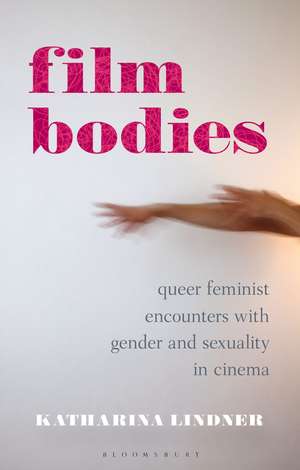Film Bodies: Queer Feminist Encounters with Gender and Sexuality in Cinema: Library of Gender and Popular Culture
Autor Katharina Lindneren Limba Engleză Paperback – 5 oct 2022
Din seria Library of Gender and Popular Culture
- 22%
 Preț: 230.61 lei
Preț: 230.61 lei - 30%
 Preț: 567.99 lei
Preț: 567.99 lei - 23%
 Preț: 191.31 lei
Preț: 191.31 lei - 30%
 Preț: 656.47 lei
Preț: 656.47 lei - 23%
 Preț: 196.96 lei
Preț: 196.96 lei - 30%
 Preț: 540.09 lei
Preț: 540.09 lei - 20%
 Preț: 219.27 lei
Preț: 219.27 lei - 23%
 Preț: 191.04 lei
Preț: 191.04 lei - 22%
 Preț: 231.34 lei
Preț: 231.34 lei - 30%
 Preț: 509.52 lei
Preț: 509.52 lei - 30%
 Preț: 540.65 lei
Preț: 540.65 lei - 30%
 Preț: 509.52 lei
Preț: 509.52 lei - 13%
 Preț: 174.25 lei
Preț: 174.25 lei - 28%
 Preț: 496.43 lei
Preț: 496.43 lei - 23%
 Preț: 197.24 lei
Preț: 197.24 lei - 23%
 Preț: 191.22 lei
Preț: 191.22 lei - 23%
 Preț: 223.28 lei
Preț: 223.28 lei - 30%
 Preț: 598.91 lei
Preț: 598.91 lei - 30%
 Preț: 510.03 lei
Preț: 510.03 lei - 24%
 Preț: 189.61 lei
Preț: 189.61 lei - 23%
 Preț: 191.56 lei
Preț: 191.56 lei - 24%
 Preț: 196.08 lei
Preț: 196.08 lei - 23%
 Preț: 146.78 lei
Preț: 146.78 lei - 21%
 Preț: 216.99 lei
Preț: 216.99 lei - 23%
 Preț: 197.24 lei
Preț: 197.24 lei - 24%
 Preț: 196.44 lei
Preț: 196.44 lei - 30%
 Preț: 538.61 lei
Preț: 538.61 lei - 23%
 Preț: 196.96 lei
Preț: 196.96 lei - 30%
 Preț: 597.87 lei
Preț: 597.87 lei - 23%
 Preț: 197.05 lei
Preț: 197.05 lei - 14%
 Preț: 176.44 lei
Preț: 176.44 lei - 23%
 Preț: 222.46 lei
Preț: 222.46 lei
Preț: 174.07 lei
Preț vechi: 224.90 lei
-23% Nou
Puncte Express: 261
Preț estimativ în valută:
33.31€ • 34.78$ • 27.57£
33.31€ • 34.78$ • 27.57£
Carte disponibilă
Livrare economică 14-28 martie
Livrare express 27 februarie-05 martie pentru 77.39 lei
Preluare comenzi: 021 569.72.76
Specificații
ISBN-13: 9781350258365
ISBN-10: 1350258369
Pagini: 328
Ilustrații: 26 bw illus
Dimensiuni: 138 x 216 x 21 mm
Greutate: 0.43 kg
Editura: Bloomsbury Publishing
Colecția Bloomsbury Academic
Seria Library of Gender and Popular Culture
Locul publicării:London, United Kingdom
ISBN-10: 1350258369
Pagini: 328
Ilustrații: 26 bw illus
Dimensiuni: 138 x 216 x 21 mm
Greutate: 0.43 kg
Editura: Bloomsbury Publishing
Colecția Bloomsbury Academic
Seria Library of Gender and Popular Culture
Locul publicării:London, United Kingdom
Caracteristici
Draws on a broad range of sources, including close readings of mainstream and independent cinema such as Black Swan, The Tango Lesson, 2 Seconds, Offside, Tomboy and Girlhood
Notă biografică
Katharina Lindner was Lecturer in Film and Media and a member of the Centre for Gender and Feminist Studies at the University of Stirling, UK. Before becoming an academic, she was a celebrated professional footballer, scoring 128 goals for Glasgow City before she retired from the game in 2011.
Cuprins
Chapter 1 - Queer(ing) PhenomenologyChapter 2 - Female Bodies in 'Action': Gender/Genre TroubleChapter 3 - 'Throwing Like a Girl'? Physicality and Athletic Performance on ScreenChapter 4 - Dancing on Screen: Mirror-ing MovementChapter 5 - Queer Cinema: Queer Orientations?Chapter 6 - Conclusion
Recenzii
Lindner provides a welcome guide through new terrain. Deftly navigating the challenge of bringing feminist and queer thought together, Film Bodies raises important questions about how the social, spatial and corporeal coordinates of cinematic being are imbricated.
I cannot think of a single other scholar in the world who combines such an integrated approach to philosophical phenomenology, queer theory and feminist theory while also examining contemporary films in such insightful detail.
In this challenging and provocative book, Katharina Lindner tackles the problems that film phenomenology has skirted around for years. What is a queer feminist phenomenology? What about female bodies that are in movement, that disrupt, that display themselves and unsettle? Who can speak about them and for them? Lindner looks at filmic female bodies that dance and play sport, and that are performatively queer, and examines the thrilling spaces and affective timeframes in which they move. The result is a new realm of queer feminist embodiment that enables different kinds of non-normative lived bodies to become visible and active, from tango dancers to tomboys, and boxers to ballerinas. A vital and significant development of film phenomenology.
Film Bodies vibrantly explores the intersections between film phenomenology and queer and feminist theories. Through a series of agile textual analyses, Lindner draws out the potential of the gendered body to trouble both cinema's sensory experience and film theory s critical categories. Film Bodies is an essential contribution to queer film scholarship.
I cannot think of a single other scholar in the world who combines such an integrated approach to philosophical phenomenology, queer theory and feminist theory while also examining contemporary films in such insightful detail.
In this challenging and provocative book, Katharina Lindner tackles the problems that film phenomenology has skirted around for years. What is a queer feminist phenomenology? What about female bodies that are in movement, that disrupt, that display themselves and unsettle? Who can speak about them and for them? Lindner looks at filmic female bodies that dance and play sport, and that are performatively queer, and examines the thrilling spaces and affective timeframes in which they move. The result is a new realm of queer feminist embodiment that enables different kinds of non-normative lived bodies to become visible and active, from tango dancers to tomboys, and boxers to ballerinas. A vital and significant development of film phenomenology.
Film Bodies vibrantly explores the intersections between film phenomenology and queer and feminist theories. Through a series of agile textual analyses, Lindner draws out the potential of the gendered body to trouble both cinema's sensory experience and film theory s critical categories. Film Bodies is an essential contribution to queer film scholarship.
